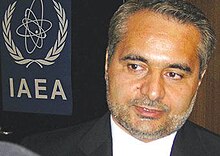Seyed Hossein Mousavian

Dr. Seyed Hossein Mousavian is an Iranian policymaker and scholar who has served on Iran’s nuclear diplomacy team in negotiations with the EU and International Atomic Energy Agency. He currently resides in the United States, where he is a visiting research scholar at Princeton University.
Biography
Born in Kashan, Iran, in 1957, he studied at the Iran University of Science and Technology, as well as Sacramento City College and Sacramento State University in the United States. From 1980-1990, Mousavian was Editor-in-Chief of the daily newspaper Tehran Times, during which time he authored more than 2,000 articles. He also held a number of positions in the Iranian government in the 1980s, including a stint as Vice President of the Islamic Propagation Organization (1981-1983), worked with future-President Hashemi Rafsanjani as Chairman of the Parliament Administration Organization (1983-1986), and was Head and then Director General of the West Europe department of the Foreign Ministry (1986-1989). Mousavian was Iran’s Ambassador to Germany from 1990-1997.[1] Subsequently, he headed the Foreign Relations Committee of the Supreme National Security Council (SNSC) of Iran during the eight years of Mohammad Khatami’s presidency. Mousavian meanwhile continued his education in the late 1990s, receiving a Masters degree from the University of Tehran in 1998 and a PhD from the University of Kent in the UK in international relations in 2002.
He later served as Foreign Policy Advisor to Ali Larijani, Secretary of the Supreme National Security Council (2005-7), and Vice President of the Center for Strategic Research and in a variety of capacities for the Expediency Discernment Council’s Center for Strategic Research (CSR) from 2005-2008. During this period he was Editor-in-Chief or a member of the Editorial Board for numerous CSR publications, including the Journal of Human Rights Studies, Journal of International Security and Terrorism, Rahbord (Strategy) Magazine, and Journal of Disarmament.
Mousavian has since 2009 been a visiting research scholar at Princeton University’s Woodrow Wilson School of Public and International Affairs. [2]
Role in Iranian Diplomacy
Mousavian played a role in a number of key developments during his more than two decades working on Iranian foreign affairs. He helped to secure the release of two German hostages held by Hezbollah in Lebanon from 1990-1993 and American and other Western hostages held in Lebanon in 1998-1999, as well as contributing to the mediation of the largest-ever humanitarian exchange between Israel and Lebanese Hezbollah under Germany’s auspices (1995-1996). Mousavian also played a role in Iran’s cooperation with the US in Afghanistan against Al Qaeda and the Taliban in 2001.[3][4]
From 2003-2005, Mousavian was Spokesman of the Iranian nuclear negotiation team, which in 2003 agreed for Iran to provisionally suspend uranium enrichment and allow inspections by the International Atomic Energy Agency at its nuclear sites as confidence building measures. Mousavian’s negotiating team was replaced shortly before the election of Mahmoud Ahmadinejad as President in 2005, in tandem with Supreme Leader Ali Khamenei's announcement that Iran would resume enrichment activities.
Accusations of Espionage
Mousavian was arrested and briefly jailed by the Ahmadinejad administration in 2007 and publicly accused by the president of espionage for allegedly providing classified information to Europeans, including the British Embassy, before being cleared by the judiciary.[5] There was speculation that his arrest was part of a factional struggle between Ahmadinejad and a triumvirate of his opponents: Akbar Hashemi Rafsanjani, Mohammad Khatami, and Hassan Rowhani, of whom Mousavian was considered an ally.[6] After a year, a spokesman of Iran's judiciary announced that Mousavian had been cleared of the espionage charge after investigation by three different judges. However, the third of those judges had sentenced him to a suspended term of two years in prison and to a five-year ban from holding official diplomatic posts because of his confessed opposition to the foreign and nuclear policy of President Ahmadinejad. Accusations were renewed on August 22, 2010, when the Ministry of Intelligence issued a statement repeating the old claims publicly announced by Ahmadinejad in 2007.[7] Mousavian’s lawyer has questioned this development, arguing that the Ministry of Intelligence statement ran contrary to the verdict reached three years earlier by the Iranian judiciary.
Bibliography
- Imam Khomeini: His Life and Leadership, 1990, Saffron Publications, London, UK
- Islamic Thinkers of Germany, 1995, Institute for Political and International Studies (IPIS), Iranian Foreign Ministry
- Challenges of Iran-West Relations; Analysis of Iran-Germany Relations, 2006, The Center for Strategic Research
- Iran-Europe Relations: Challenges and Opportunities, 2008, Routledge Press, London, UK
- Additional Protocol and Islamic Republic’s Strategy, 2008, The Center for Strategic Research
- Human Rights: Trends and Viewpoints, 2008, The Center for Strategic Research
- The Iranian Nuclear Crisis: A Memoir, 2012, Carnegie Endowment for International Peace
References
http://www.princeton.edu/sgs/faculty-staff/seyed-hossein-mousavian/
- ^ Iran arrests former nuclear envoy
- ^ [1]
- ^ Iranian Diplomat in U.S. Opens Window on Tehran
- ^ Seyyed Hossein Mousavian, Iran-Europe Relations: Challenges and Opportunities, Routledge Press, London: 2008
- ^ Iran official charged with spying
- ^ Former Nuclear Negotiator Was A Spy, Says Iranian Ministry
- ^ وزارت اطلاعات: موسویان جاسوس بود
External links
http://www.princeton.edu/sgs/faculty-staff/seyed-hossein-mousavian/
